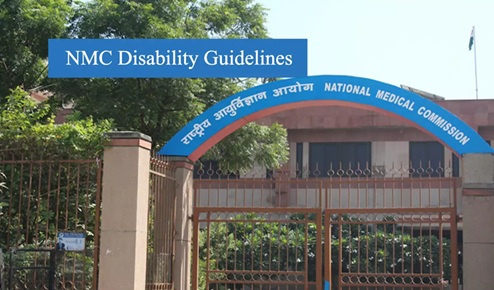| (Welfare schemes for vulnerable sections of the population by the Centre and States and the performance of these schemes; Mechanisms, Laws, Institutions and Bodies constituted for the protection and betterment of these vulnerable sections) |
Reference
The National Medical Commission (NMC) has released interim guidelines for MBBS admission for Persons with Benchmark Disabilities (PwBD) for the academic session 2025-26, shifting the focus from percentage of disability to functional ability.

Key provisions of the guidelines
- Objective: To ensure equitable inclusion of candidates with disabilities in medical education.
- Self-attested affidavit: Candidates with disabilities will have to submit a mandatory Unique Disability Identification Card (UDID) along with a self-declaration stating the activities they can (and cannot) perform.
- Medical Board Verification: Candidates will have to appear before one of the 16 designated Medical Boards for verification of their functional abilities, where their ability to meet the requirements of the MBBS curriculum will be assessed.
- Focus on Functional Ability: These guidelines incorporate assessment of the ability of candidates to compensate for deficiencies through alternative functionalities in place of the earlier numerical disability threshold.
- Compliance with Rights of Persons with Disabilities Act: Medical colleges have been directed to comply with the Rights of Persons with Disabilities Act, ensure inclusive infrastructure and appropriate facilities.
Impact
- The guidelines aim to balance inclusivity with the academic and clinical rigour of MBBS programmes.
- However, the limited number of Medical Boards and their uneven distribution across states pose challenges for candidates as it may require students with disabilities to travel long distances for certification.
Criticism
- NMC The interim guidelines of the NMC follow the Supreme Court's directive to amend the admission process for students with disabilities. However, critics argue that these guidelines may promote ableism.
- For example, requirements such as climbing stairs are considered irrelevant to medical practice.
- Critics advocate facilities such as elevators in hospitals, as is prevalent in countries such as the UK.
Conclusion
The NMC's move underlines the need for systemic changes to promote diversity and ensure inclusiveness in India's medical workforce.